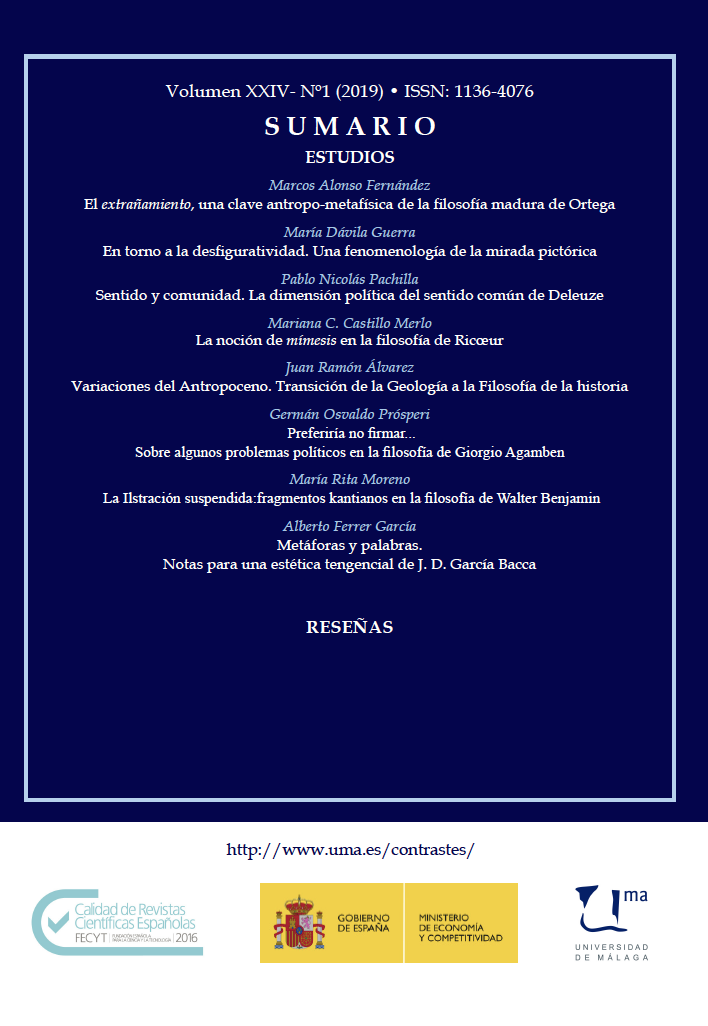The Suspended Enlightenment: Kantian Fragments in Walter Benjamin’s Thought
DOI:
https://doi.org/10.24310/Contrastescontrastes.v24i1.6710Keywords:
Benjamin, language, violence, EnlightenmentAbstract
This article focuses on two texts belonging to Walter Benjamin’s early production –On Language as Such and on the Language of Man (1916) and Critique of Violence (1921), in order to identify certain conceptual trails related to Kantian thought.Taking such trails as a starting point, some fragments of the theoretical outlook in which Walter Benjamin expounds such particularly dialectic tautness through which –in spite of objecting to Enlightenment– he defends criticism asthe unavoidable mode to update philosophical thinking are to be outlined.Downloads
Metrics
Publication Facts
Reviewer profiles N/A
Author statements
Indexed in
-
—
- Academic society
- N/A
- Publisher
- Universidad de Málaga
References
ADORNO, T. 2013: Introducción a la dialéctica, tr. M. Dimópulos. Buenos Aires: Eterna Cadencia.
BENJAMIN, W. 1998a: “Sobre el programa de la filosofía venidera”, en Iluminaciones IV, tr. R. J. Blatt Weinstein. Madrid: Taurus.
BENJAMIN, W. 1998b: “Sobre el lenguaje en general y sobre el lenguaje de los humanos”, en Iluminaciones IV, tr. R. J. Blatt Weinstein. Madrid: Taurus.
BENJAMIN, W. 2009: “Para una crítica de la violencia”, en Estética y política, tr. T. A. Bartoletti y J. M. Buchenhorst. Buenos Aires: Las Cuarenta.
BENJAMIN, W. 2012: Origen del Trauerspiel alemán, tr. C. Pivetta. Buenos Aires: Gorla.
BERDET, M. 2017: “La trilogía política”, en P. Oyarzún R., C. Pérez López y F. Rodríguez (eds.), Letal e incruenta. Walter Benjamin y la crítica de la violencia. Santiago de Chile: LOM.
BUCK-MORSS, S. 2011: Origen de la dialéctica negativa: Theodor Adorno, Walter Benjamin y el Instituto de Frankfurt, tr. N. Rabotnikof Maskivker. Buenos Aires: Eterna Cadencia.
GARCÍA, L. 2015: “Medialidad pura. Lenguaje y Política en Walter Benjamin”, Recial, 8 (6) 1-1. Recuperado de https://revistas.unc.edu.ar/index.php/recial/article/view/12964
GRÜNER, E. 2007: Las formas de la espada. Miserias de la teoría política de la violencia. Buenos Aires: Colihue.
HORKHEIMER, M. 1974: “Teoría tradicional y teoría crítica”, en Teoría crítica, tr. E. Albizu y C. Luis. Buenos Aires: Amorrortu.
HORKHEIMER, M. 2007: Crítica de la razón instrumental, tr. H. A. Murena y D. J. Vogelmann. La Plata: Terramar.
JAY, M. 1974: La imaginación dialéctica, tr. J. C. Curutchet. Madrid: Taurus.
KANT, I. 2003: Crítica del discernimiento, tr. R. Rodríguez Aramayo. Madrid: Mínimo Tránsito/Antonio Machado Libros.
REYES MATE, M.2006: Medianoche en la historia. Comentarios a las tesis de Walter Benjamin «Sobre el concepto de historia». Madrid: Trotta.
VEDDA, M. 2012: “Introducción: Melancolía, transitoriedad, utopía. Sobre El origen del Trauerspiel alemán”, en W. Benjamin, Origen del Trauerspiel alemán, tr. C. Pivetta. Buenos Aires: Gorla.
VILLACAÑAS, José L. y GARCÍA, R. 1996: “Walter Benjamin y Carl Schmitt: Soberanía y Estado de Excepción”, Daimon. Revista de Filosofía, n° 13, julio-diciembre, pp. 41-60.
WEBER, T. 2014: “Experiencia”, en M. Opitz y E. Wizisla (eds.), Conceptos de Walter Benjamin, ed. castellana al cuidado de M. Belforte y M. Vedda. Buenos Aires: Las cuarenta.
Downloads
Published
How to Cite
Issue
Section
License
This journal provides immediate free access to its content under the principle of making research freely available to the public. All content published in Contrastes. Revista Internacional de Filosofía, are subject to the Creative Commons Attribution-NonCommercial-ShareAlike 4.0 license whose full text can be found at <http://creativecommons.org/licenses/by-nc-sa/4.0>
It is the responsibility of the authors to obtain the necessary permissions of the images that are subject to copyright.
Authors whose contributions are accepted for publication in this journal will retain the non-exclusive right to use their contributions for academic, research and educational purposes, including self-archiving or repository in open access repositories of any kind.
The electronic edition of this magazine is edited by the Editorial Service of the University of Malaga (Uma Editorial), being necessary to cite the origin in any partial or total reproduction.










5.png)
